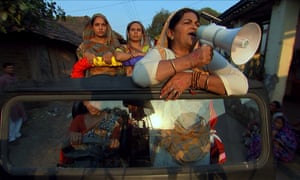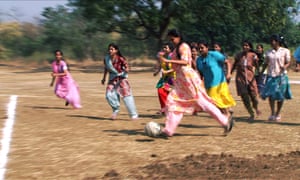Over 400m people watch show, with storyline including acid attacks, domestic violence and abortion of female foetuses
An Indian soap opera whose themes include acid attacks, domestic violence and high rates of abortion of female foetuses has quietly become one of the most-watched programmes on the planet.
India’s public broadcaster announced in April that the audience for Main Kuch Bhi Kar Sakti Hoon – I, a woman, can achieve anything – had, in two seasons, exceeded 400 million viewers “and counting”.
Partly funded by UK foreign aid, and designed by an NGO to promote sexual health and family planning, the enormous reach of the radio and TV series was unexpected, says Poonam Muttreja, the executive director of the Population Foundation of India who developed the programme.
“Our estimate was that we would get 250 calls a day,” she says of a hotline they established for viewer feedback three years ago. “First day, first show, we got 7,000 calls within one hour. Within two hours, our switchboard collapsed.”
By the end of the first season more than 1.4 million Indians had called to comment on the drama unfolding around Sneha Mathur, the programme’s protagonist, who turns her back on a lucrative career as a doctor in Mumbai to practice in her home village of Pratappur.
In one of the typically unflinching storylines for which the programme has become known, Mathur returns to her village after her sister is forced into a late-term abortion of a female foetus, and dies during the procedure.
In another episode, another sister is attacked with acid by a local boy after she joins a mixed-sex football team.

The programme’s directors and writers spent a year visiting the Indian hinterland researching the social problems that persist in the country, especially in its villages. Muttreja says that an ignorance of sexual health is a key issue.
“India has the old family planning programmes in the region,” she says. “And yet we’ve not had much success. Even today, women in neighbouring countries like Sri Lanka, Nepal or Pakistan have access to more methods of contraception.”
Indian women and their partners are often unaware of the benefits of using condoms, delaying their first conception, or spacing out pregnancies to allow their bodies to recover. Around 85% of the money allocated to family planning is spent on sterilising women, with much of the rest spent on abortions, which are often carried out unsafely and cause nearly one in 10 maternal deaths.
Female foeticide also persists, and despite more than two decades of condemnation by the Indian government, the imbalance between men and women is projected to widen over the next 15 years. “It was so frustrating for us in the development sector, because behaviour just wasn’t changing,” Muttreja says.
Then she came across a South African TV programme, Soul City, whose similarly stark depiction of life in the country’s townships is credited with decreasing HIV prevalence among women. “It showed that entertainment education, if done well, can very quickly change social norms, and then lead to behavioural change,” Muttreja says.
Research conducted in Bihar and Madhya Pradesh, two of India’s poorest states, has shown similar promise for Main Kuch Bhi Kar Sakti Hoon.
After watching the first season, nearly 40% of women polled agreed that marriage at a very young age risked the lives of both mothers and children – up from 25% before it was screened. Among men, just 2% thought early marriage was problem before watching the show, but that number rose to nearly one in three after.
Attitudes about domestic violence also shifted. After watching the programme, the number of women who agreed a wife deserved to be beaten if suspected of cheating on her husband had reduced by over 30%. Among men questioned, 22% fewer agreed.
But the producers are well aware of the lines they cannot cross. “You can’t talk about sexual intercourse,” Muttreja says. “So we didn’t talk about intercourse. We didn’t talk about unmarried adolescents’ need for contraception – not explicitly.
“Homosexuality would be a no-no,” she adds. “It would be controversial.”

Soap operas have been a cultural juggernaut in India since the early 2000s, when cable television reached an increasing number of middle-class homes.
In a country where government can be a marginal – and sometimes malign – influence on people’s lives, celebrities wield enormous power, says Shoma Munshi, an anthropologist and author of two books on Indian soaps.
“When [Bollywood film star] Amitabh Bachchan says please give your child two polio drops, they listen to him more than to the government of India.
“Nobody trusts a cop in India, nobody trusts a politician. But with soap star Tulsi and other heroines, people actually believe them when they say something,” she says.
Director Feroz Abbas Khan is aware of the show’s limitations. “Let’s not mistake that this one television programme is going to change everything,” he says, adding that in a conservative society, the programme is clearly breaking boundaries. “In our society, nobody speaks. Children and parents don’t have conversations about sex.
“We’re talking about menstruation, masturbation, contraceptives,” he says. “These things never came on our TV. We’ve pushed the envelope.”
The third season of Main Kuch Bhi Kar Sakti Hoon is currently in development.






























